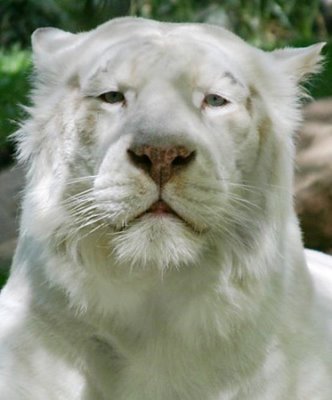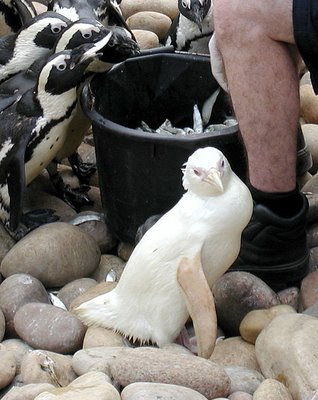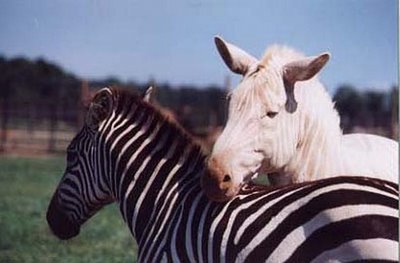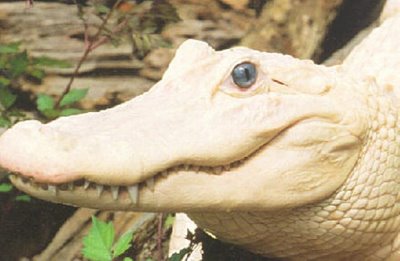
Albinism (from Latin albus, meaning "white") is a lack of pigmentation in the eyes, skin and hair. Albinism is an inherited condition resulting from the combination of recessive alleles passed from both parents of an individual. This condition is known to affect mammals, fish, birds, reptiles, and amphibians. While the most common term for an individual affected by albinism is "albino", some prefer "person with albinism", because "albino" is sometimes used in a derogatory way. The gene which results in albinism prevents the body from making the usual amounts of the pigment melanin. Albinism used to be categorised as Tyrosinase positive or negative. In cases of Tyrosinase positive albinism, the enzyme tyrosinase is present but is unable to enter pigment cells to produce melanin. In tyrosinase negative cases, this enzyme is not produced. This classification has been rendered obsolete by recent research.
 Most every Native American tribe had some manner of "spirit" belief regarding albino animals. The Albino was protected by most Native American customs. Within the Northeastern Woodlands, Leni Lenape, Susquehannock, Iroquois (Six Nations) etc. One primary principle: The Albino was not to be hunted or killed. This taboo carried various curses. According to Bear Two Arrows (Eastern Delaware), knowledgeable of owl medicine, the taboo and its various curses are known among more respectful contemporary hunters with or without Native American ancestry. He relates his own experience regarding an albino owl, and it's connection to owl spirit medicine. [Leni Lenape words for: white, Wapsu; owl, Gokhos.] If an albino squirrel were hunted and killed, the hunter would suffer loss of his hunting abilities. If an albino deer were killed (and without remorse) the hunter might later loose his life in a freak accident often involving his hunting or survival skills. The general belief in certain legends concerning various individual animals persists into the 20th century, many of which can be documented.
Most every Native American tribe had some manner of "spirit" belief regarding albino animals. The Albino was protected by most Native American customs. Within the Northeastern Woodlands, Leni Lenape, Susquehannock, Iroquois (Six Nations) etc. One primary principle: The Albino was not to be hunted or killed. This taboo carried various curses. According to Bear Two Arrows (Eastern Delaware), knowledgeable of owl medicine, the taboo and its various curses are known among more respectful contemporary hunters with or without Native American ancestry. He relates his own experience regarding an albino owl, and it's connection to owl spirit medicine. [Leni Lenape words for: white, Wapsu; owl, Gokhos.] If an albino squirrel were hunted and killed, the hunter would suffer loss of his hunting abilities. If an albino deer were killed (and without remorse) the hunter might later loose his life in a freak accident often involving his hunting or survival skills. The general belief in certain legends concerning various individual animals persists into the 20th century, many of which can be documented. 
 Among all tribes, the Albino animal had spirit connections, one of the strongest among the Plains tribe was the White Buffalo, a definite omen of great wisdom. The symbolic significance behind white or the quality of "whiteness" was not associated with purity as in Western culture but also wisdom and ancient knowledge of greater conceptual and spiritual magnitude.
Among all tribes, the Albino animal had spirit connections, one of the strongest among the Plains tribe was the White Buffalo, a definite omen of great wisdom. The symbolic significance behind white or the quality of "whiteness" was not associated with purity as in Western culture but also wisdom and ancient knowledge of greater conceptual and spiritual magnitude. 
Depending on the animal species involved and how it corresponds within the greater tribal cosmological context sometimes manifests the extent of the consequences when the taboo is broken. Belief in the "spirit nature" of albino animals and the ritual taboo of protection probably has its roots in the fact that an albino's ability to survive natural predators is greatly reduced by the lack of proper pigmentation for camouflage and keener vision to spot prey. These natural attributes render an albino "unfair" game for the Native hunter, or any hunter aware of the spiritual nature these animals might possess. Even the skin or hides of these animals must be treated with reverence.


